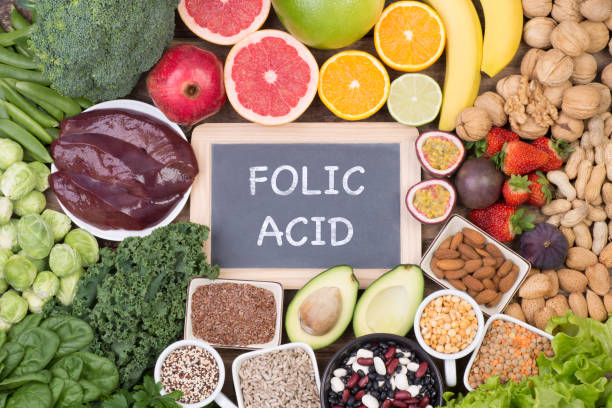Vitamin B9 was first discovered in yeast, but later isolated from spinach leaves. For this reason, it was given the names folic acid or folate, words derived from the Latin word folium, meaning “leaf.”
Types
Vitamin B9 comes in several different forms, including:
Folate: A family of vitamin B9 compounds that naturally occurs in foods.
Folic acid: A synthetic form commonly added to processed foods or sold as a supplement. Some scientists are concerned that high-dose folic acid supplements may cause harm.
L-methylfolate: Also known as 5-methyltetrahydrofolate, L-methylfolate is the active form of vitamin B9 in the body. As a supplement, it is thought to be healthier than folic acid.
Role and Function
- Vitamin B9 acts as a coenzyme and is essential for cell growth, DNA formation and amino acid metabolism.
- It is very important during periods of rapid cell division and growth, such as in infancy and pregnancy.
- Additionally, it is required for the formation of red and white blood cells, so deficiency may lead to anemia.
Dietary Sources
- The chart below presents a few foods that are great sources of vitamin B9.
- Other good sources include leafy greens, legumes, sunflower seeds and asparagus. Yeast extract spread is exceptionally rich in vitamin B9, providing around 3,786 mcg per 100 grams.
- Folic acid is also frequently added to processed food products.
Recommended Intake
The table below shows the recommended daily allowance (RDA) for vitamin B9. It also presents the daily tolerable upper limit (UL), which is the amount considered safe for most people. The RDA for infants hasn’t been established. Instead, the table shows the adequate intake values.
RDA (mcg/day) UL (mcg/day)
Infants 0–6 months 65* –
7–12 months 80* –
Children 1–3 years 150 300
4–8 years 200 400
9–13 years 300 600
14–18 years 400 800
Adults 19+ years 400 1,000
Pregnancy 600 800–1,000
Lactation 500 800–1,000
*Adequate intake
Deficiency
- Vitamin B9 deficiency rarely occurs on its own. It is usually associated with other nutrient deficiencies and a poor diet.
- Anemia is one of the classic symptoms of vitamin B9 deficiency. It is indistinguishable from the anemia associated with vitamin B12 deficiency.
- Lack of vitamin B9 may also lead to birth defects of the brain or neural chord, collectively known as neural tube defects.
Side Effects and Toxicity
- No serious adverse effects of high vitamin B9 intake have been reported.
- Yet, studies show that high-dose supplements may mask vitamin B12 deficiency. Some even suggest that they may worsen the neurological damage associated with vitamin B12 deficiency.
- Additionally, some scientists are concerned that a high intake of folic acid — a synthetic form of vitamin B9 — may cause health problems.
Benefits of Supplements
- There is not much evidence that folic acid supplements benefit healthy people who are following a balanced diet.
- A few studies suggest that supplements may reduce the risk of heart disease, improve blood sugar control and slightly reduce the symptoms of depression.
- However, the benefits of taking vitamin B9 supplements may only be seen in those who are low in the vitamin to begin with.
Summary of Vitamin B9
- Like all other B vitamins, vitamin B9 acts as a coenzyme. It is essential for cell growth and various key metabolic functions.
- It is found in both plants and animals. Rich sources include liver, legumes and leafy greens.
- Deficiency in vitamin B9 is uncommon. The main symptom is anemia, but in pregnant women, low levels also raise the risk of birth defects. High intake doesn’t have any serious adverse effects.
- For those who get enough vitamin B9 from their diet, the benefits of supplements are unclear. But studies suggest they may reduce the risk of heart disease and lower blood sugar levels.

